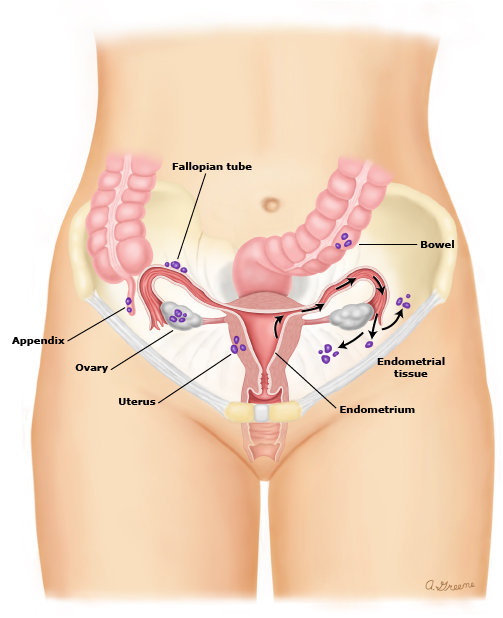Endometriosis is an inflammatory disease that affects 1 in 10 women. In this article, we’ll explore how endometriosis influences your fertility and how it impacts fertility treatments like egg-freezing and IVF.
What exactly is endometriosis?
Endometriosis is a chronic disease where endometrium-like tissues grow outside of the uterus. You might be wondering, what are endometrium-like tissues?
Endometrium is the lining of the uterus, which changes throughout the menstrual cycle. It thickens to create a cozy, nourishing environment for a potential pregnancy after ovulation. If no pregnancy occurs, the lining sheds as part of menstruation. A new fresh lining is grown in the next cycle.
It’s normal for this lining to live and grow inside of the uterus. The problems begin when these tissues travel outside of the uterus and adhere to surrounding pelvic organs like the fallopian tubes and ovaries. These external endometrial adhesions respond to menstrual hormonal fluctuations as well, which can cause additional bleeding or painful cramps that extend into the abdomen or lower back.
However, unlike regular endometrial tissue, this abnormal tissue doesn’t shed during menstruation. The build-up of this abnormal tissue over time can lead to inflammation and cysts called endometriomas, which can cause severe pain.
Endometriosis may be diagnosed by laparoscopic surgery, and biopsy if needed, where a doctor can visually identify the growth of endometriomas. Once diagnosed, the condition is classified into one of four stages based on how much endometrial tissue has grown and where it is in the body.
However, because endometriosis manifests itself differently in each person, it can be difficult to diagnose – and many people do suffer without a diagnosis (which is why it’s important to raise awareness for this condition!).
Symptoms don’t necessarily correlate with the stage. For example, some people may suffer severe symptoms but only be diagnosed with stage 1 endometriosis, while some stage 4 patients may have minimal symptoms.1
Surgery is a potential option to remove endometriomas, but this approach is used with caution depending on where the lesions are growing. For example, surgical removal can cause damage to the ovaries or scarring on other organs that impact fertility. Endometriomas and symptoms may also reappear months after surgery.
How does endometriosis impact fertility?
Endometriosis is known to be a leading condition associated with infertility. The inflammation, adhesions, and scarring on the fallopian tubes and ovaries, among other factors caused by endometriosis, may all contribute to fertility challenges.2
Furthermore, surgical intervention to remove endometriomas may result in diminished ovarian reserve, and some studies have also indicated that there is a connection between endometriosis and reduced egg quality.3
While this all may sound discouraging, many women with endometriosis are still able to get pregnant and have a successful live birth! Another study has shown that while severe endometriosis can negatively affect ovarian response and egg quality, the rate of fertilization remains consistent across the various stages of the disease.4

Can egg freezing or IVF support patients with endometriosis?
With many advances in assisted reproductive technologies, those living with endometriosis have options available to preserve and support their fertility journey. Egg freezing and IVF bypass some of the fertility complications that endometriosis can cause. For example, stimulating the ovaries during treatment encourages the release of multiple mature eggs, and embryo transfer bypasses the fallopian tubes, where blockages by endometriosis scar tissue are common.
Still, it’s important to note that IVF success rates may also be affected by factors such as egg quality, uterine receptivity, and other individual patient factors. Due to the condition’s progressive impact over time, and the possibility that several IVF cycles may be necessary, it’s often recommended for endometriosis patients who plan to expand their family in the future to consider egg freezing at a younger age whenever feasible.5
If you are contemplating egg freezing or IVF as part of your endometriosis management and fertility plan, ask your clinic in advance of your egg retrieval about receiving a personalized egg quality report. VIOLET™ reports (for egg freezing patients) and MAGENTA™ reports (for IVF patients) leverage AI technology to analyze images of each egg taken by the fertility clinic’s lab after a retrieval to assess their likelihood of developing into a blastocyst (a day 5-6 embryo). Understanding your unique egg quality (especially as it may have been affected by endometriosis) equips you and your clinician to make more informed decisions about your fertility treatment.
Despite the challenges posed by endometriosis, there is hope and opportunity for those seeking to preserve their fertility. By understanding the disease, its impact on fertility, and exploring options like egg freezing and IVF, individuals can be better prepared to navigate decisions along the fertility journey.
1 https://www.hopkinsmedicine.org/health/conditions-and-diseases/endometriosis#
2 https://www.reproductivefacts.org/news-and-publications/fact-sheets-and-infographics/endometriosis-does-it-cause-infertility/
3 https://www.ncbi.nlm.nih.gov/pmc/articles/PMC5508680/
4 https://www.ncbi.nlm.nih.gov/pmc/articles/PMC9635609/
5 https://www.ncbi.nlm.nih.gov/pmc/articles/PMC4785156/
Join our mailing list for dispatches on the future of fertility


